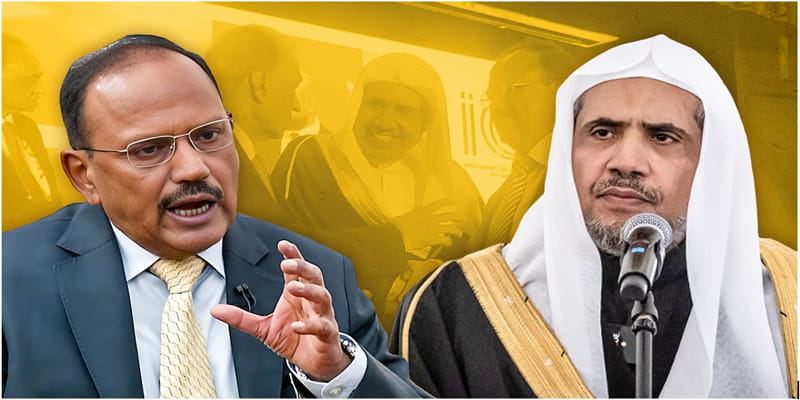
Credits: Kartik Kakar, Newslaundry
India was host to a high level visitor from Saudi Arabia in the form of Dr. Mohammad Bin Abdulkarim Al-Issa, Secretary General of the Muslim World League in early July 2023. This was no ordinary visitor. Dr. Issa is a highly influential scholar and religious leader who has been in the forefront of promoting dialogue among civilisations in the world. Dr. Issa’s visit is of great significance to the India-Saudi Arabia relationship, with the two states having recently taken a number of steps to enhance the relationship, especially in the fields of culture, trade and defence. India and Saudi Arabia signed the Haj 2023 bilateral agreement to facilitate the Haj pilgrimage for Indians. It enables 1,75,025 Indians to make the pilgrimage. Saudi Arabia meets almost 18% of India’s oil requirements and millions of Indians live and work in Saudi Arabia. Under Prime Minister Modi, India’s relations with Saudi Arabia have taken rapid strides.
A high-level visitor
Dr. Issa’s visit is believed to have taken place at the personal initiative of the Indian National Security Adviser Shri Ajit Doval. The latter held detailed talks with Dr. Issa and hosted a dinner in his honour in which dignitaries from all walks of life and belonging to different denominations were present. In a display of religious unity in diversity, Dr. Issa visited Akshardham temple. In addition, Sheikh Al-Issa met Prime Minister Narendra Modi, President Draupadi Murmu, National Security Adviser Ajit Doval, Home Minister Amit Shah and External Affairs Minister Dr Jaishankar, and other political and Islamic and non-Islamic religious Indian individuals of eminence. It was the first time in four centuries that a non-Indian – the Secretary General of the Muslim World League – led Friday prayers at the Jama Masjid in Delhi.
The speeches delivered by Dr. Issa during his visit represents a carefully thought out presentation of Islam as well as how Islam and Saudi Arabia view India’s pluralistic and multi-religious society.
It is clear from the speeches that Dr. Issa had high regard for the way in which India is handling its Muslim community and ensuring religious and communal harmony. He was also clear that Hindu-Muslim unity and peaceful coexistence is essential for India’s progress and offered the full support of the Muslim World League to achieve this objective.
He was also full of praise for India’s Constitution and the idea of Vasudhaiva Kutumbakam that was the foundation of Indian civilisation.
NSA Ajit Doval’s remarks on India’s pluralism
In a major speech at the India Islamic Cultural Centre on July 11, 2023 to welcome Dr. Issa, National Security Adviser Ajit Doval outlined the role of Muslims in India and the nature of India’s diversity. The main points made by him were:
The deep spiritual contents of Hinduism and Islam brought the people together and helped in bringing about a social and intellectual understanding of each other. It gave rise to a distinct and vibrant expression of peace and harmony, notwithstanding the vagaries of political ups and downs. While the historians have focused more on the political events, they have failed to capture the societal undercurrents that brought the people together.
It was no coincidence that despite having around 200 million Muslims, the involvement of Indian citizens in global terrorism has been incredibly low.
India believes in doctrines of convergence, dialogue and peace leading to conflict avoidance and mitigation.
Dr. Issa’s speeches on Islam and India’s positive example
Dr. Issa delivered three main speeches during his stay in Delhi. The main points made by him were the following:
Saudi Arabia appreciates the ancient history of India, the cultural and civilisational history, and the importance of the communication with this history in our Islamic world. Saudi Arabia also appreciates the positive diversity in the Republic of India that is valued by the concept of coexistence through awareness, accompanied by wisdom from this coexistence.
Saudi Arabia is also aware of the fact that the Islamic community in the Indian Republic takes pride in nationalism and are proud Indians. It also takes pride in the Indian Constitution and works in collaboration with the government to implement it.
He praised Indian philosophy as the driving force for global harmony. Indian philosophy has the potential to resolve some of the critical challenges faced by the world today. He has learned much about peace and harmony from reading Hindu religious texts such as the Srimad Bhagwad Gita and having discussions with various Hindu leaders. He said he wanted to also study the Vedas and the Upanishads, but had found no Arabic version of them available.
What the Hindu leaders said
Hindu leaders on the other hand, in their interactions with Dr. Issaexplained the paramount Hindu philosophy which recognised that God pervades everything and each soul is potentially divine. They explained that Hinduism is not idol worship but Hindus recognised that as the beginning of the pursuit of spiritual growth.
They explained that all religions are equal and true, and that Hindus accept, and not just tolerate other religions. This has made them more diverse and tolerant internally as well as externally. They said Hinduism regards everyone’s faith and practices as sacred.
They said the DNA of Hinduism protected the faiths and practices of all and different people. In Hinduism, there is no Them Vs Us approach, as that is expressly condemned as small mindedness in the Rig Veda. They also emphasized the importance of diversity and evoked the Rig Veda, one of the world's most ancient scriptures, to draw lessons about universal tolerance and acceptance.
Sanatan Dharma teaches us love and compassion for everyone and true selfless service for nature. Tolerance needs to become a part of our lives. Interfaith dialogue is the only path for the future. However, it is just the beginning, and there is a need for such regular discussion.